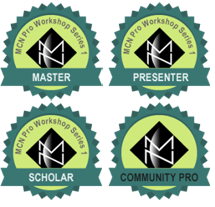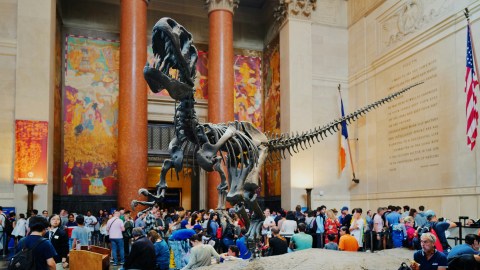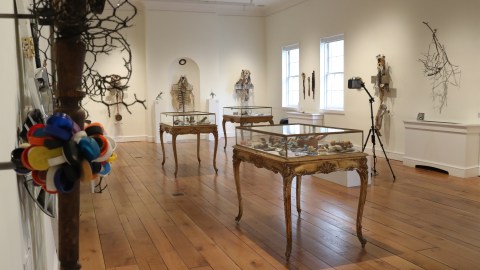
Personal Learning Networks. Participatory Learning Environments. MOOCs. Gamification. Microcredentials. The world of formal education is in quite a state of foment these days, with new paradigms and alternate models of instruction and assessment of achievement gaining steam. One trend that has developed a tremendous amount of attention is the idea of badge systems as an alternative to traditional forms of indicating achievement. In this post Ed Rodley, exhibit developer at the Boston Museum of Science, explores two examples from the museum sector that are trying to use badges as a way to both acknowledge achievement in a professional development context, and foster community and encourage participation with museum visitors.
Just what are badges?
The idea behind badge systems is really quite simple. If you ever saw a Boy or Girl Scout with their collection of merit badges, then you’ve seen a badge system at work. The idea is that a badge signifies achievement in a particular task. Weave your basket , get the Basket Weaving badge, sew it on your sash, and everyone knows you’ve mastered basket weaving. The badge is a credential of achievement like a diploma, only on a much, much smaller scale. This is why badge systems are often referred to as microcredential systems. Some of the affordances of a badge system are that it works well for informal and interest-driven learning. You the learner decide which skills you want to pursue and therefore what badges you get. You can learn anywhere, anytime and have a way of signaling your achievement. Unlike a certificate from an educational institution, a badge can represent traditional academic achievement or “soft” 21st century skills. They can also represent commitment or interest, in a narrowly defined setting. To their promoters, badge systems have the potential to fuel an explosion in online learning. To badge skeptics, they are a classic example of an extrinsic motivation that will get in the way of the learning that they’re supposed to represent. In other words, they fear that collecting badges will overshadow achieving mastery of the subjects those badges stand for.
The badge proponents have some powerful backers. The MacArthur Foundation, The Gates Foundation, Mozilla Foundation, and others have all committed tremendous time, energy and money into developing microcredential systems. A quick search of MacArthur’s Digital Media and Learning site will give you a sense of the energy behind badge systems and the diversity of ways badges are being considered for use in formal and informal education. In the museum sector, badge systems are just getting underway include the Museum Computer Network’s MCNPro, and the Dallas Museum of Art’s DMA Friends & Partners program.
The Museum Computer Network – MCNPro
 In 2011, The Museum Computer Network, a non-profit professional organization founded in 1967, conducted a community survey to see what services museum technology professionals wished the organization could offer. MCN’s members wanted to learn about the latest technology trends, find ways to expand their skills with new and emerging technologies, and get help starting to use these technologies in their museums. Traditionally, these kinds of opportunities have been bread-and-butter events at annual museum conferences, but the potential reach of a one-time-only conference event is tiny compared to that of an online event. So MCN partnered with LearningTimes, the company behind the Museums and Mobiles online conference and a leader in interactive online learning experiences, to develop an online webinar series called MCNPro. This series of five web-based workshops will launch in December and cover topics like creating a video channel and getting into digital publishing. Workshop participants will earn a digital badge for their involvement, and have the chance to earn more badges by both taking more classes, and by sharing their own expertise with the MCN community as presenters. The badge system will serve both as a certificate of accomplishment and as a system for recognizing increased participation in the MCN community.
In 2011, The Museum Computer Network, a non-profit professional organization founded in 1967, conducted a community survey to see what services museum technology professionals wished the organization could offer. MCN’s members wanted to learn about the latest technology trends, find ways to expand their skills with new and emerging technologies, and get help starting to use these technologies in their museums. Traditionally, these kinds of opportunities have been bread-and-butter events at annual museum conferences, but the potential reach of a one-time-only conference event is tiny compared to that of an online event. So MCN partnered with LearningTimes, the company behind the Museums and Mobiles online conference and a leader in interactive online learning experiences, to develop an online webinar series called MCNPro. This series of five web-based workshops will launch in December and cover topics like creating a video channel and getting into digital publishing. Workshop participants will earn a digital badge for their involvement, and have the chance to earn more badges by both taking more classes, and by sharing their own expertise with the MCN community as presenters. The badge system will serve both as a certificate of accomplishment and as a system for recognizing increased participation in the MCN community.Dallas Museum of Art – DMA Friends & Partners
The Dallas Museum of Art announcedlast month that they were doing away with paid admission. They also announced that they were replacing their paid membership systems with a free system called DMA Friends & Partners. Friends earn badges for participating in DMA events, and according to Deputy Director Rob Stein, badges will become an incentive economy that will hopefully serve as scaffolds for deeper engagement. So if you get the jazz badge for attending an evening jazz event, you can get a further badge if you go to the galleries and find artworks that relate to jazz. And if this doesn’t seem radical enough, DMA is also developing a point system for their badges that will allow Friends redeem points for rewards, from typical membership perks like tickets to special exhibitions to more boutique experiences, like watching a conservator at work. These boutique experiences can then be captured while they’re happening and fed into DMA’s social media channels, published on their blogs and magazine, and reinforce visitors’ motivation to participate with the museum. Stein even speculated that if systems like theirs become widespread, museum badge systems could grow into reciprocal programs that could allow people to spend points earned at one museum in another museum.
If you would like to learn more about digital badges, and their potential for influencing the future of education, Ed recommends these links:
Badge advocates
Could Badges for Lifelong Learning Be Our Tipping Point?
Six Ways to Look at Badging Systems Designed for Learning
Badge skeptics
Still a Badge Skeptic
How to Earn Your Skeptic “Badge”
A balanced approach
Badges for Learning: Threading the Needle Between Skepticism and Evangelism










Fascinating stuff! I think it's time to investigate this in the world of online collections. For the few websites that actually allow visitor feedback, would this encourage even more feedback? I would love to hear from anyone who has tried this. It's just been added to project wish list.
Karin
Museum Advisor
ANSM
Thank you bringing some light to the work going on with badges in museums. And thank you for referencing Six Ways, which I developed last Spring. I am now working at the American Museum of Natural History, as their new Associate Director For Digital Learning. (More on my new position here.) We are just now launching a beta for a new badging system that will explore all of these frames across a number of programs. People with interest can follow this work at http://Twitter.com/mmmooshme.
It will be interesting to see what the next year brings, as more institutions dip their toes in the water of microcredentials. I'd love to hear from anybody else who's thinking of a badging system in 2013.
At Minnesota Children's Museum we're recognizing our volunteers for the amount of time they have served with badges. It's not quite the same angle as those who are using badges as proof of a skill or a "certification," but it's helping us recognize our people while giving them the chance to show their friends and followers they volunteer with us.
http://basno.com/users/minnesotachildrensmuseum
I think "badges", or certifications in technology are a great idea for museums. Traditionally, technology hasn't been woven into the creative culture of museum professionals. With the importance of web, social media and other interactive technologies that can promote engagement with museum audiences,this is an idea whose time has come.